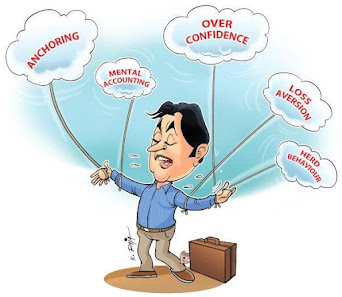10 Biases in "Behavior finance theory" that every Investor & Trader must know !!
1. CONFIRMATION BIAS
"Confirmation bias" is the natural human tendency to seek or emphasize information that confirms an existing conclusion or hypothesis. It is a major reason for investment mistakes as investors are often overconfident because they keep getting data that appears to confirm the decisions they have made. This overconfidence can result in a false sense that nothing is likely to go wrong, which increases the risk of being blindsided when something does go wrong.
2. INFORMATION BIAS
"Information bias" is the tendency to evaluate information even when it is useless in understanding a problem or issue. The key in investing is to see the wood from the trees and to carefully evaluate information that is relevant to making a more informed investment decision and to discard (and hopefully ignore) irrelevant information. Investors are bombarded with useless information every day, from financial commentators, newspapers and stockbrokers. It is difficult to filter through it to focus on information that is relevant.
3. LOSS AVERSION BIAS
"Loss aversion" is the tendency for people to strongly prefer avoiding losses than obtaining gains. Closely related to loss aversion is the endowment effect, which occurs when people place a higher value on a goods that they own. The loss aversion or endowment effect can lead to poor and irrational investment decisions, whereby investors refuse to sell loss-making investments in the hope of making their money back.
The loss-aversion tendency breaks one of the cardinal rules of economics (The measurement of opportunity cost). To be a successful investor over time you must be able to properly measure opportunity cost and not be anchored to past investment decisions due to the inbuilt human tendency to avoid losses. Investors who become anchored due to loss aversion will pass on mouth-watering investment opportunities to retain an existing loss-making investment in the hope of recouping their losses.
4. INCENTIVE CAUSED BIAS
"Incentive-caused bias" is the power that rewards and incentives can have on human behavior, often leading to folly. The sub-prime housing crisis in the US is a classic case study in incentive-caused bias. Notwithstanding that financiers knew that they were lending money to borrowers with appalling credit histories and in many cases people with no incomes or jobs and limited assets. An entire industry, with intelligent people, was built on lending to such people.
5. OVERSIMPLIFICATION TENDENCY
In seeking to understand complex matters humans tend to want clear and simple explanations. Unfortunately, some matters are inherently complex or uncertain and do not lend themselves to simple explanations. In fact, some matters are so uncertain that it is not possible to see the future with any clarity. Many investment mistakes are made when people oversimplify uncertain or complex matters.
Albert Einstein said “Make things as simple as possible, but no more simpler.”
A key to successful investing is to stay within your "Circle Of Competence". A key part of it is to concentrate our investments in areas that exhibit a high degree of predictability and to be wary of areas that are highly complex and/or highly uncertain.
6. HINDSIGHT BIAS
"Hindsight bias" is a tendency to see beneficial past events as predictable and bad events as not predictable. In recent years, we have read many explanations for poor investment performance that blame the unpredictability and volatility of markets. Some of the explanations are as credible as a school child complaining to the teacher that "The dog ate my homework". While we have made mistakes, we will not blame our mistakes on so-called unpredictable events. In fact, not a single mistake we have made over the past five years could be attributed to an unpredictable event or market volatility but rather to errors of judgment.
7. BANDWAGON EFFECT [ GROUP-THINK / HERD MENTALITY ]
The "Bandwagon effect or Group-think" describes gaining comfort in something because many other people are doing the same.
To be a successful investor you must be able to analyze and think independently. Speculative bubbles are typically the result of "Herd mentality".
8. RESTRAINT BIAS
"Restraint bias" is the tendency to overestimate one’s ability to show restraint in the face of temptation. This is most often associated with eating disorders. Most people are wired to be "Greedy" and want more of a good thing or a "Sure winner". For many people, money is the ultimate temptation. The issue for many investors is how to properly size an investment when they believe they have identified a "Sure winner".
9. NEGLECT OF PROBABILITY
Humans tend to ignore "Probability" in decision making. Most people are inclined to oversimplify and assume a single point estimate when making investment decisions. Businesses that are more mature, less subject to economic cycles and have particularly strong competitive positions tend to have a tighter distribution of valuation outcomes than businesses that are less mature or more subject to economic cycles or are more subject to competitive forces.
10. ANCHORING BIAS
"Anchoring bias" is the tendency to rely too heavily on a past reference or one piece of information when making a decision. The studies show that people are influenced in their answer or anchored to the random number that they have focused on prior to being asked the question.
To connect with us for "Free", you can checkout the links below :
Telegram : Logical Investor
Whatsapp : +91 8527767668
Quora : Trade & Invest
Regards !!



No comments:
Post a Comment